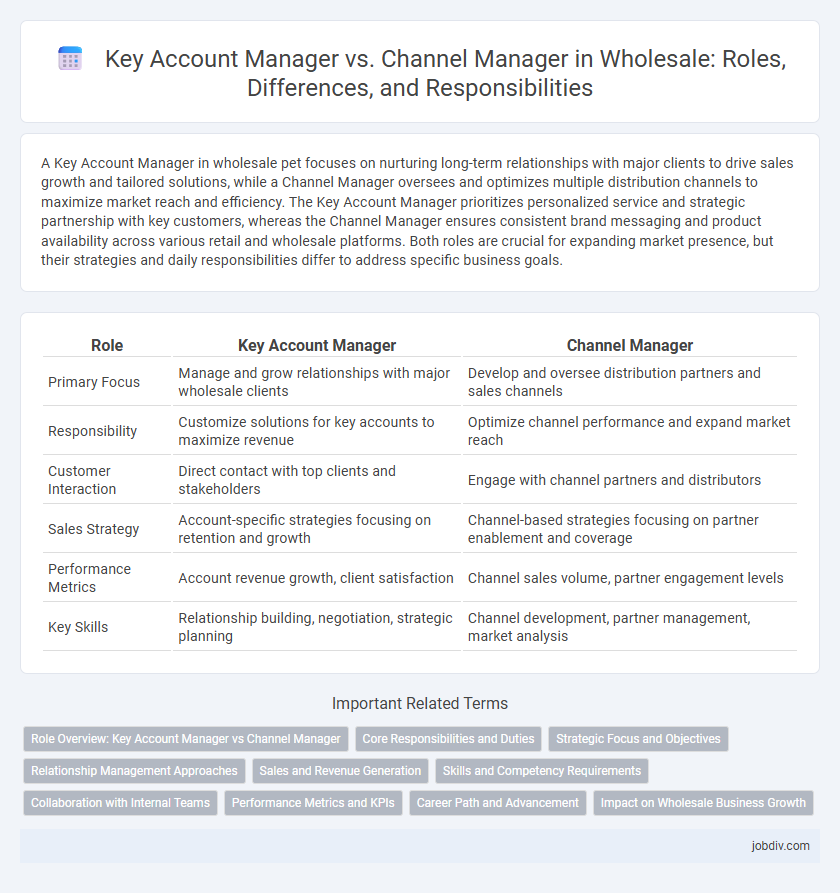A Key Account Manager in wholesale pet focuses on nurturing long-term relationships with major clients to drive sales growth and tailored solutions, while a Channel Manager oversees and optimizes multiple distribution channels to maximize market reach and efficiency. The Key Account Manager prioritizes personalized service and strategic partnership with key customers, whereas the Channel Manager ensures consistent brand messaging and product availability across various retail and wholesale platforms. Both roles are crucial for expanding market presence, but their strategies and daily responsibilities differ to address specific business goals.
Table of Comparison
| Role | Key Account Manager | Channel Manager |
|---|---|---|
| Primary Focus | Manage and grow relationships with major wholesale clients | Develop and oversee distribution partners and sales channels |
| Responsibility | Customize solutions for key accounts to maximize revenue | Optimize channel performance and expand market reach |
| Customer Interaction | Direct contact with top clients and stakeholders | Engage with channel partners and distributors |
| Sales Strategy | Account-specific strategies focusing on retention and growth | Channel-based strategies focusing on partner enablement and coverage |
| Performance Metrics | Account revenue growth, client satisfaction | Channel sales volume, partner engagement levels |
| Key Skills | Relationship building, negotiation, strategic planning | Channel development, partner management, market analysis |
Role Overview: Key Account Manager vs Channel Manager
A Key Account Manager focuses on managing and nurturing relationships with high-value clients, ensuring their needs are met and driving long-term business growth through strategic partnerships. A Channel Manager oversees distribution channels, developing and optimizing partnerships with resellers, distributors, or retailers to maximize product reach and sales performance. Both roles require strong communication skills and market insight but differ in target focus: direct client management versus external channel development.
Core Responsibilities and Duties
Key Account Managers focus on maintaining and expanding relationships with major clients, ensuring personalized service and tailored solutions to meet their specific needs. Channel Managers are responsible for developing and managing distribution channels, optimizing partner performance, and driving sales through indirect routes. Both roles require strategic planning and coordination but differ in the scope of client interaction and channel management focus.
Strategic Focus and Objectives
Key Account Managers concentrate on nurturing long-term relationships with top-tier clients to maximize revenue and ensure client retention through customized solutions. Channel Managers focus on optimizing partner networks, enhancing distribution efficiency, and expanding market reach by strategically managing indirect sales channels. Both roles prioritize growth but differ, with Key Account Managers targeting direct client engagement while Channel Managers drive expansion via intermediary partners.
Relationship Management Approaches
Key Account Managers focus on deep, personalized relationships with high-value clients to drive long-term loyalty and revenue growth through tailored solutions. Channel Managers prioritize managing and optimizing various distribution channels, fostering collaboration with multiple partners to expand market reach and ensure consistent brand messaging. Both roles require strong communication skills, but Key Account Managers emphasize direct customer engagement, while Channel Managers leverage strategic partnerships to maximize sales performance.
Sales and Revenue Generation
Key Account Managers drive sales and revenue growth by nurturing strong relationships with high-value clients and ensuring tailored service to meet their specific needs. Channel Managers focus on optimizing partnerships with distributors and resellers to expand market reach and increase overall sales volume. Both roles are critical in wholesale, with Key Account Managers emphasizing client retention and Channel Managers prioritizing broadening distribution networks for revenue enhancement.
Skills and Competency Requirements
Key Account Managers in wholesale require advanced relationship-building skills, strategic planning, and in-depth knowledge of key client business models to drive long-term partnerships and revenue growth. Channel Managers focus on channel development, partner enablement, and multi-channel distribution strategies, needing strong negotiation, conflict resolution, and market analysis capabilities. Both roles demand excellent communication, sales acumen, and data-driven decision-making proficiency tailored to optimizing wholesale performance.
Collaboration with Internal Teams
Key Account Managers collaborate closely with sales, marketing, and product teams to tailor solutions for high-value clients, ensuring personalized service and long-term relationships. Channel Managers work with logistics, merchandising, and finance departments to optimize distribution channels and maximize partner performance. Both roles require seamless internal communication to align strategies and drive revenue growth in wholesale operations.
Performance Metrics and KPIs
Key Account Managers (KAMs) are primarily evaluated on metrics such as customer retention rates, revenue growth within key accounts, and average deal size, reflecting their focus on deepening strategic partnerships and maximizing account profitability. Channel Managers, in contrast, focus on sales volume through distribution networks, channel partner satisfaction scores, and market coverage efficiency to optimize indirect sales performance. Both roles prioritize pipeline velocity and sales cycle length, but KAMs emphasize account-specific metrics while Channel Managers rely on broader network engagement and channel activation KPIs.
Career Path and Advancement
Key Account Managers typically advance by deepening client relationships and expanding portfolio value in wholesale, often progressing to Senior Account or Sales Director roles. Channel Managers focus on optimizing partner networks and channel sales strategies, leading to opportunities as Channel Directors or Partnerships VPs. Career growth in both paths hinges on expertise in stakeholder management, strategic planning, and revenue generation within wholesale markets.
Impact on Wholesale Business Growth
Key Account Managers drive significant wholesale business growth by fostering strong relationships with high-value clients, ensuring personalized solutions that increase order volume and customer loyalty. Channel Managers expand market reach through effective management of distribution partners, optimizing sales channels to boost overall revenue. Both roles are critical, with Key Account Managers focusing on deep client engagement and Channel Managers enhancing network scalability in wholesale operations.
Key Account Manager vs Channel Manager Infographic

 jobdiv.com
jobdiv.com